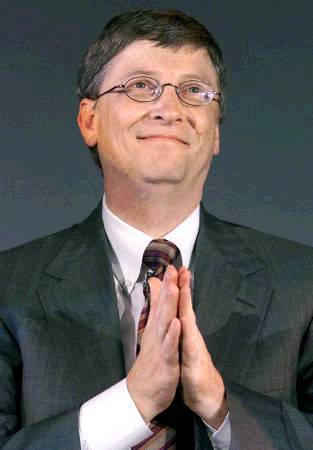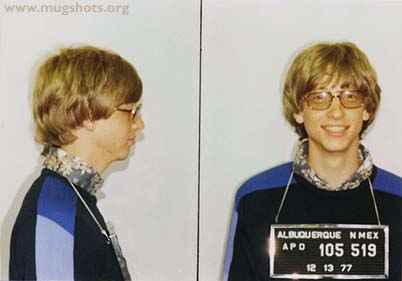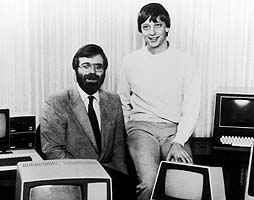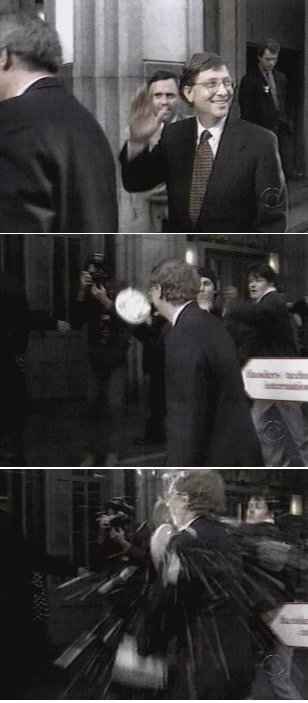|
Bill Gates Well, somebody had to be the richest man on Earth, but why did it have to be him? William Henry Gates III, now just called "Bill Gates" or "billg", rules over a company that is the undisputed monopoly of the computer software business, with tendrills extending in nearly all related fields (and some unrelated ones as well). Through his efforts and the efforts of the folks he has groomed over the decades, his domain and personal wealth have increased at near psychotic-levels while at the same time causing what some might consider permanent damage to the landscape of the very industry he helped form.
Well, somebody had to be the richest man on Earth, but why did it have to be him? William Henry Gates III, now just called "Bill Gates" or "billg", rules over a company that is the undisputed monopoly of the computer software business, with tendrills extending in nearly all related fields (and some unrelated ones as well). Through his efforts and the efforts of the folks he has groomed over the decades, his domain and personal wealth have increased at near psychotic-levels while at the same time causing what some might consider permanent damage to the landscape of the very industry he helped form.
In the present day, it is quite useless to discern where Microsoft ends and Bill begins, and vice versa. Instead, to get any idea of Bill Gates, it's best to go back to the 1970s and the early 1980s, before Microsoft went public and shot the little dweeb into the financial stratosphere. People with roman numerals after their names generally don't lead hard lives, and Gates started his life in a rich suburb of Seattle, Washington. He was sent to the Lakeside Private school starting at age 13, where the school started acquiring a number of high-tech toys from local industry and sales. Gates fell in love with computers at that point, a relationship that never really soured for him. With his best friend Paul Allen, Gates founded the Lakeside Programming Group in 1971. Not a company but really more of a social group, they made it a goal to get as much computer time as possible from local businesses. One particularly useful contact was the Computer Center Corporation, C-Cubed, which Gates and the rest of the Programming Group would do computer work for in exchange for time on the machines at night. In the first of several major ironies, Gates and pals would comb through the source code of the computer systems they worked on to get programming ideas. Gates and friends would try and pick up any job they could, and a big break came when a local company offered them the task of writing a payroll program. The amount being paid, however, was not enough to support all four authors, and Gates was asked to leave the group. This was a mistake; Gates' response was, it is said, "Look, if you (ever) want me to come back you have to let me be in charge. But this is a dangerous thing, because if you put me in charge this time, I'm going to want to be in charge forever after". Prophetic words indeed, and in fact the others talked it through and Gates stayed on for the project. Soon the Lakeside group was getting more and more jobs, including a class scheduling program for their school. (Gates has claimed that he programmed the scheduling software so that it always scheduled him together with all the prettiest girls in his class). Another major project was analyzing traffic data for the Washington Road Department, to determine allocation of funds. For these projects, the Lakeside Programming Group made thousands of dollars in income. But then came graduation. Gates was accepted to Harvard and began attending in 1974, intending to study either Mathematics or Law. But college wasn't where Gates wanted to be, and he dropped out late in his freshman year. His riches earned later have often caused his biographies to say he "attended Harvard", which is being very charitable. Of course, he has received a number of honorary doctorates since then.
It was during his time down in New Mexico that Gates was stopped for a traffic infraction. Unfortunately, the complete details of his arrest and mugshot have been lost to time, either intentionally (if you're a conspirator) or simply because who would have thought anyone would give a shit about some geek getting pulled over 20 years ago. Either way, all we have to go by is this snapshot of Gates being hauled in front of the camera, grinning his ass off, perhaps thinking himself above it all or incredulous that things had gotten that far. Gates has changed his story several times on what happened that night, but the most plausible is that he ran a stop light and wasn't carrying his license with him when he was pulled over, requiring a visit down to the station. The photo also unintentionally captures classic Gates: completely wrecked hair, terrible looking clothes, generally slovenly appearance, and two glazed eyes staring out past thick glasses. This image changed very little over the bulk of Gates' career, with the shower taps running at much less frequency than the money taps. It should also be noted that this isn't some heaping of sour grapes from the gutter staring up at Bill's mountain of success; throughout the time he has been known in public, Bill's dedication to all-nighters and in-the-trenches energy ensured a number of high-profile press conferences and demonstrations where his lack of hygiene became as breathtaking as the product being demonstrated.
The letter drips with ironies, as Gates asks a group of people to stop taking his software and using it for free, when in fact his entire distribution model had depended on these very groups, and his product wasn't his exclusively in the first place. Needless to say, these sort of demands became much easier once Gates' company essentially corralled the entire market under its wing. Gates and Allen moved Micro Soft back home to Seattle, Washington in 1979, where it has remained to this day. Also remaining to this day have been the interesting traits of Gates' personality: intensity, single-mindedness, and a screeching myopia about competitors and the market in general. Most of these traits have transferred to the company's practices, which are worthy of an entry in themselves.
Money is not everything, so they say, and life with your nose placed firmly into a screen could be quite empty. As he was shuffled from meeting to convention, from press conference to all-night planning session, Gates no doubt yearned for companionship. Of course, his approaches might have left something to be desired. He was infamous for his "virtual dates", where he would have a woman he was interested in see a movie in whatever city she was living in at the same time he was, and then they would discuss the movie over the phone later. And it was inevitable that the female employees of a company owned by a bachelor who also happened to be the most loaded man in the universe would begin to swarm like bees at a honey festival. Semi-joke buttons were worn by employees offering themselves, and nobody would turn down any such interest by Big Bill. So it should come as no major surprise when Mr. Gates settled his eye on one Melinda French, a marketing manager within the company, in the early 1990's. It is beyond our research to conclude the nature of the relationship, but it has survived more than many such high-profile couplings; and on January 1, 1994, Gates rented a Hawaiian island and married Melinda. It is worth noting that it's actually kind of illegal to rent a Hawaiian island, but we'll give Bill the benefit of the doubt and assume it wasn't his word that shut down public roads and access during the length of the wedding on Lanai, for security reasons. Money Trumps Law is a pretty easy equation to work out in any checkbook. Gates has been naturally quiet about his home life since that time, but it is known that he has twice bucked the odds of most programmers and produced children by Melinda, names of Jennifer and Rory. He also lives in a home whose size, automation, and cost have achieved legendary status within the state of Washington, but that's almost a pre-requisite of multi-billionaires. In a worthwhile side note, Gates was targeted and hit with a Pie while attending a meeting in Brussels hosted by Flemish Minister and President Van den Brande in 1998. While he later waved off the effect of the pie on him, the look on his face, stumbling away looking for somewhere to clean up in private, says it all: the teary-eyed, stricken gaze of the picked-upon nerd. It is likely the last time anything like that will happen again, if he can pay enough. |
 What caused Gates to drop out was the January 1975 issue of Popular Electronics, which touted the new Altair microcomputer, a shot across the bow of the geekdom world that said that computers were about to become more affordable, more accessible, and amazingly powerful in a short time. His undeniable nose for profit already attuned, Gates and old friend Paul Allen decided they needed to enter this market, and together they set up the Micro Soft company in Albequerque, New Mexico. Albequerque, it should be noted, had been looking like it was going to be the center of all things computer and computer-based, and that explains the non-sequitur choice by Gates and Allen to relocate themselves there.
What caused Gates to drop out was the January 1975 issue of Popular Electronics, which touted the new Altair microcomputer, a shot across the bow of the geekdom world that said that computers were about to become more affordable, more accessible, and amazingly powerful in a short time. His undeniable nose for profit already attuned, Gates and old friend Paul Allen decided they needed to enter this market, and together they set up the Micro Soft company in Albequerque, New Mexico. Albequerque, it should be noted, had been looking like it was going to be the center of all things computer and computer-based, and that explains the non-sequitur choice by Gates and Allen to relocate themselves there.
 Micro Soft (later renamed MicroSoft)'s money was to be made selling software, and while this might seem logical, at the time it was not the norm. Computers, especially for the hobbyist market, were so expensive and so time-consuming to build out of kits, that a natural social set of users and owners would trade any software they constructed freely, looking at the software as icing on a cake and hardly anyone's bread and butter. Bill's company had written a port of the BASIC programming language (previously seen on other machines, and which Bill neither designed nor paid royalties for the use of) and this software, retailing at over $600 in 1975, was freely traded among the different computer owners, since, well, six hundred dollars is a lot of fucking money. This drove the young Gates ballistic, and in that year he fired off what became known as "The Letter", or "An Open Letter to Hobbyists", in which he decried this outward theft of his (ported, design-lifted) product.
Micro Soft (later renamed MicroSoft)'s money was to be made selling software, and while this might seem logical, at the time it was not the norm. Computers, especially for the hobbyist market, were so expensive and so time-consuming to build out of kits, that a natural social set of users and owners would trade any software they constructed freely, looking at the software as icing on a cake and hardly anyone's bread and butter. Bill's company had written a port of the BASIC programming language (previously seen on other machines, and which Bill neither designed nor paid royalties for the use of) and this software, retailing at over $600 in 1975, was freely traded among the different computer owners, since, well, six hundred dollars is a lot of fucking money. This drove the young Gates ballistic, and in that year he fired off what became known as "The Letter", or "An Open Letter to Hobbyists", in which he decried this outward theft of his (ported, design-lifted) product.
 MicroSoft's fortunes became many and varied, and Gates quickly helped bring the company to various levels of industry dominance. Previously Apple Computer had gone public and made its founders instant millionaires. When Microsoft went public in 1986, Bill Gates also found himself an unbelievably rich man; the richest man in the United States. He was thirty-five years old. As time has told, Gates's fortune has increased enormously since then, making him the richest man, period. Silly calculations about his fortunes have come out, including noting that at one point William H. Gates III was personally earning $250 a second.
MicroSoft's fortunes became many and varied, and Gates quickly helped bring the company to various levels of industry dominance. Previously Apple Computer had gone public and made its founders instant millionaires. When Microsoft went public in 1986, Bill Gates also found himself an unbelievably rich man; the richest man in the United States. He was thirty-five years old. As time has told, Gates's fortune has increased enormously since then, making him the richest man, period. Silly calculations about his fortunes have come out, including noting that at one point William H. Gates III was personally earning $250 a second.